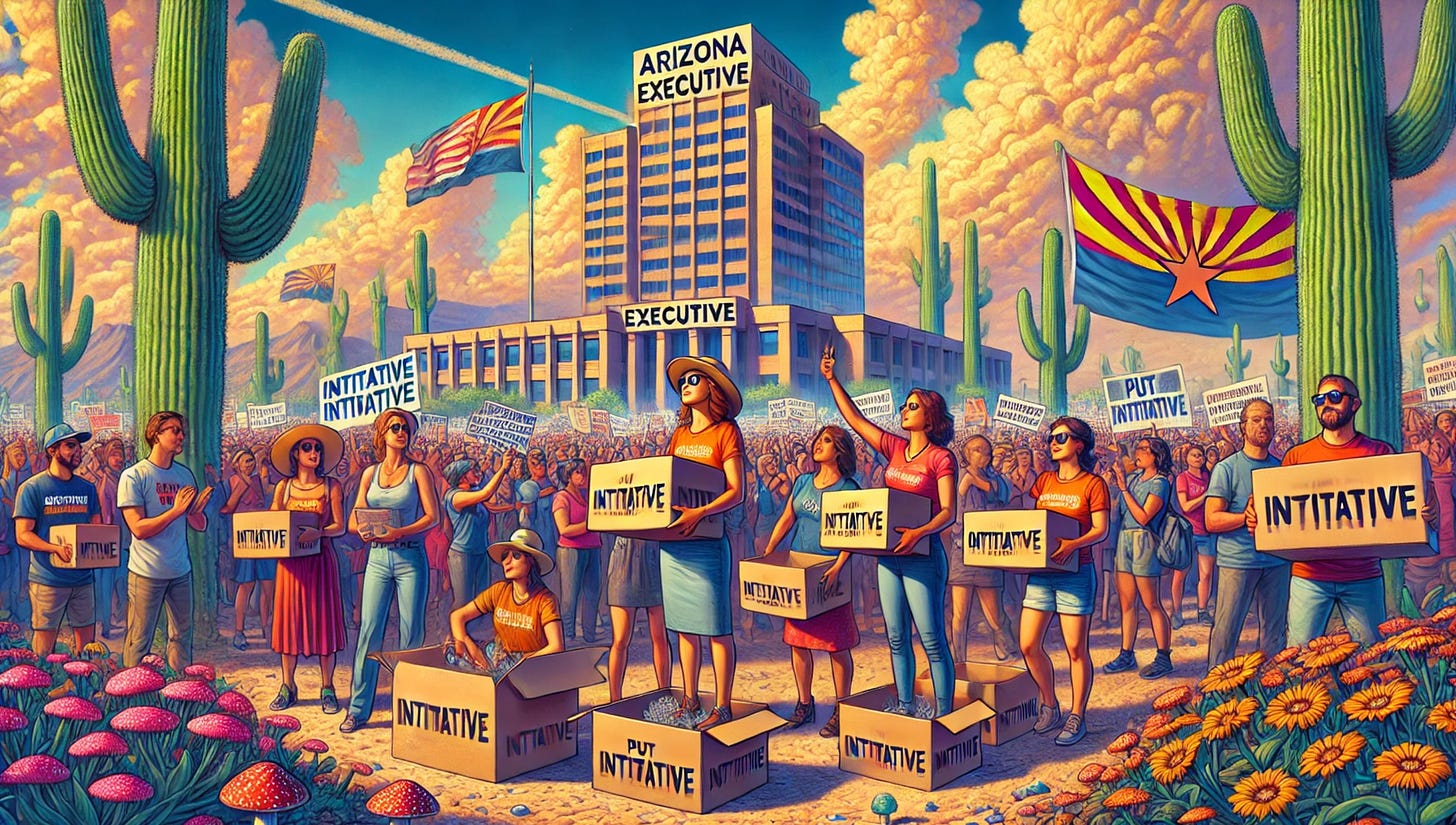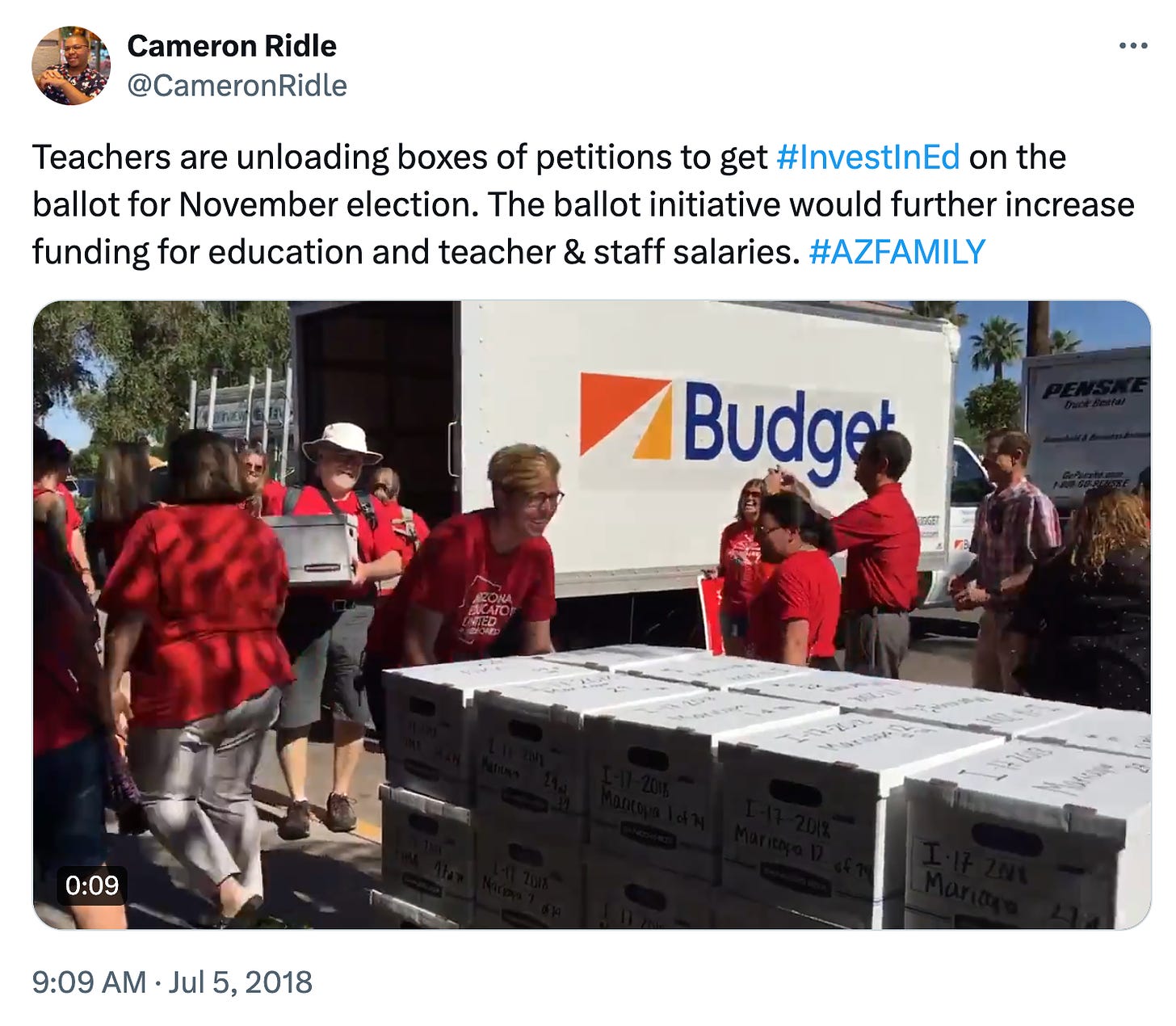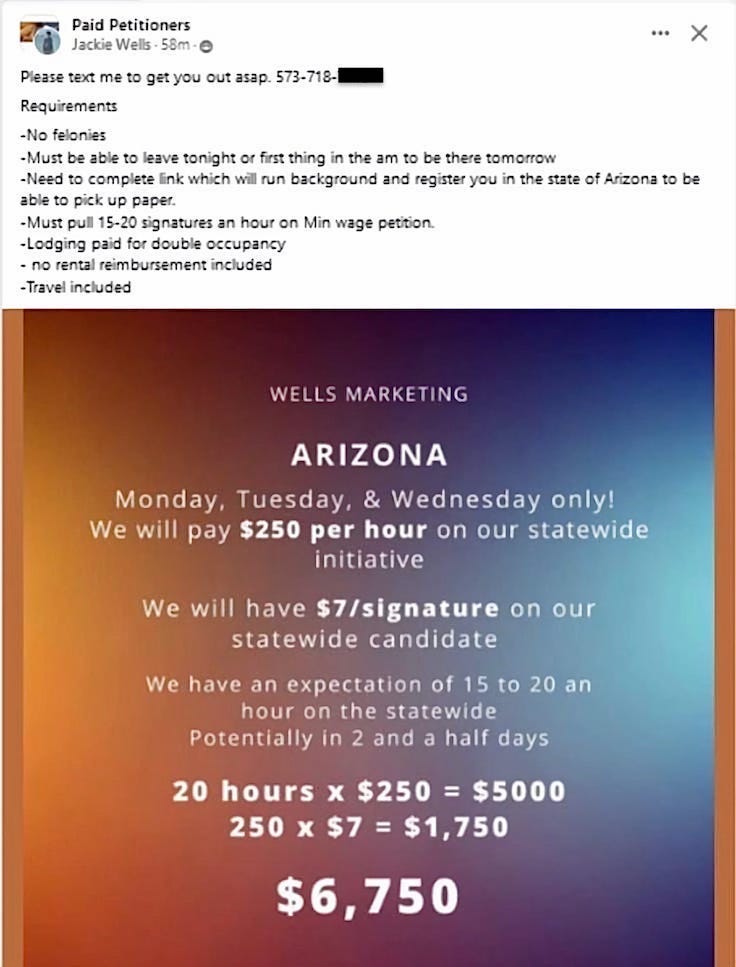Signatures in, the battles begin
Delivering signatures is just the first step … Supreme decisions … And Arizona’s best candidate isn’t running.
Today is the deadline to submit signatures to force an issue onto the ballot.
Hundreds of thousands of registered voters across the state have signed citizen initiative petitions to change laws or the state Constitution when it comes to abortion, minimum wage, and even the legalization of magic mushrooms.
If enough people sign, we’ll all get to vote on the questions in November — that’s direct democracy in action.
Signature deadline day is the first major test in a long and bumpy road between launching an initiative and seeing it become law.
Fourteen initiatives filed applications this year, but the vast majority of those were never serious anyway. Collecting the requisite minimum of 384,000 signatures for a constitutional change or 256,000 to change a law is a massive undertaking that requires an army of paid signature gatherers and millions of dollars.
So no, we don’t expect the initiative creating medicinal psychedelic mushroom dispensaries to show up at the Executive Tower with more than a quarter-million signatures today.

Instead, we’re watching out for these three initiatives.
Arizona for Abortion Access would amend the Arizona Constitution to establish a fundamental right to abortion until viability of the fetus or in order to protect the physical or mental health of the mother. Organizers announced in April that they had already surpassed the minimum 384,000 signatures to put the question on the ballot, and they plan to deliver a “historic number” of signatures today.
Make Elections Fair Arizona would do away with partisan primaries, instead making all candidates run in one big open primary with the goal of reducing the hyperpartisanship that grips primary politics. The campaign says they’ll deliver more than 580,000 signatures from Arizona voters to put it on the ballot, far more than the minimum for a constitutional amendment.
One Fair Wage Act would raise the minimum wage by an extra $1 above scheduled cost-of-living increases and would gradually require employers to pay tipped employees minimum wage as well. The campaign says it has around 400,000 signatures, above the 256,000 required.
But turning in signatures is just the first step in the idea-to-law process. Even if initiative backers show up with their boxes of petition signatures today, there are lots of potential disqualifiers down the road.
The first hurdle is signature review.
The campaigns have already spent thousands of hours and millions of dollars to collect the minimum number of required signatures from registered voters to qualify for the ballot.
But elections officials still need to determine if those signatures are even valid.
That starts with the Secretary of State’s Office, which reviews entire petition sheets to see if they meet all the requirements — that the circulator signed it, that it includes the text of the initiative and so forth. The office disqualifies any petition sheets that don’t meet the requirements.
Then the office forwards 5% of the remaining petition sheets to county recorders, who check to see if the voter listed is, in fact, a real person and registered voter. The recorders determine “validity rates” of signatures collected in their county, do a little math and guesstimate how many legitimate signatures an initiative has garnered.
Simultaneously, opponents of initiatives may be preparing lawsuits to knock it off the ballot by arguing to disqualify individual signatures, whole petition sheets or individual petition circulators and all the signatures they collected.
Lawmakers have changed the laws to ensure the courts grant broad deference to initiative challengers. It’s one of the many ways the rules are stacked against direct democracy efforts.1
Before voters weigh in, opponents can also file lawsuits challenging the form of the initiative — for example, does it violate the state Constitution’s single-subject clause?
If the initiative survives all of those hurdles, voters will have a chance to weigh in in November. But even if voters overwhelmingly approve an initiative on the ballot, that’s rarely the end of the road.
Only after all the dust is settled from the election can opponents file the most potent lawsuits — about the substance of the initiative and whether it’s constitutional.
It could be years before court battles resolve and the initiatives that deliver signatures today are actually enacted. And that’s assuming they win in November.
There’s a well-funded last-minute push to put no-chance presidential candidate and potential Biden campaign spoiler Cornel West on the Arizona ballot.
And it has drawn hundreds of out-of-state petition circulators in recent days, lured by the opportunity to earn more than $250 per hour for convincing people to sign West’s petitions and the minimum wage initiative petitions.2
NBC News has the scoop that the effort to boost West is being carried out by a company called Wells Marketing, which has worked for Blake Masters and alleged Green Party plant Mike Norton. Republican operatives launched a similar attempt in North Carolina to get West on the ballot to detract votes from Biden, NBC notes. West can’t be funding the effort himself, considering his campaign is broke.
But West isn’t actually paying that $250 per hour — someone is paying $7 per signature to get him on the ballot. The One Fair Wage Act, which would boost the minimum wage, is offering the bigger payload which is drawing signature gatherers from across state lines. Wells Marketing is running both operations and marketing the effort as a packaged deal. Many of their workers are carrying both petitions, asking voters to sign both at once.
West is benefiting from that largess and the army of petition circulators that One Fair Wage brought to the state.
Which begs the question: Why is a progressive initiative using a Republican-aligned petition circulation firm? Especially when doing so is effectively subsidizing an attempt to undercut President Joe Biden’s campaign?
“I think they’re just hired guns,” Jim Barton, attorney for One Fair Wage, told us.
West would need roughly 40,000 signatures by mid-August to qualify for the ballot as an independent.3
Supreme consequences: The U.S. Supreme Court’s recent series of decisions have serious implications for Arizona, especially the estimated 7,000 unhoused people in Phoenix who can now be arrested for sleeping on public land after the Grants Pass v. Johnson ruling. The ruling gives constitutional backing to the ordinance recently passed in Phoenix which bans camping within 500 feet of a school, childcare facility or homeless shelter and goes into effect on Sept. 1, per the Phoenix New Times’ TJ L'Heureux. The Supreme Court also declined hearing an appeal in the case of Lonnie Bassett, who was convicted for two murders committed in Arizona in 2004 and issued a mandatory sentence of life in prison without parole, even though a previous Supreme Court decision prohibited these mandatory sentences for minors, per the New York Times. Now, more than two dozen other juvenile offenders are sentenced to die in prison without clarity on whether denying them parole is legal.
A competitive emergency: Republicans are asking a federal appeals court to consider emergency action to prevent people who register to vote with federal registrations from voting for president, which would block nearly 20,000 Arizona voters from doing so, Capitol scribe Howie Fischer reports. A U.S. District judge previously denied the same request, but the Republicans’ lawyers said including the voters who use a federal form to register “impairs the relative competitive position of the Republican presidential nominee.” Meanwhile, Gov. Katie Hobbs and Republican legislative leaders are asking Attorney General Kris Mayes to pay legal fees in Mayes’ failed lawsuit challenging the transfer of $115 million in opioid settlement funds to state prisons in the budget, per the Arizona Mirror’s Gloria Gomez.
Bending the rules: Former Rep. Laura Terech announced her new gig after officially resigning from the Legislature on June 30. She is working on special projects for the Arizona Secretary of State's Office, even though state law says lawmakers can’t hold any office within state, county or city governments during their elected terms, the Republic’s Mary Jo Pitzl reports. Terech’s term ends in January 2025, but the Secretary of State’s office said legislative rules attorneys agreed her new job doesn't conflict with the constitutional intent of that rule because she’s no longer a lawmaker.
Define “significant”: A new report from the Maricopa County Sheriff’s Office shows no statistically significant disparities in traffic stops last year between Hispanic drivers and white drivers, nor Black drivers and white drivers. But it did find traffic stops of all minority drivers lasted 19 seconds longer and were 2.5% more likely to result in a citation, per KTAR. Meanwhile, about 32% of Native Americans who applied for mortgages in Arizona last year were denied, compared to an 8% denial rate for white people, Axios’ Jessica Boehm reports.
William for president: Goodyear says it has increased enforcement on street racing and added a crosswalk and traffic light to a busy road after 9-year-old Goodyear resident William Miller brought his concerns to the City Council in January, per ABC15. Miller’s grandma was almost hit by a car on one of their frequent walks, and the young activist told city council members “Me and my grandma would walk to Sonic to get some ice cream and it’s very dangerous.”
Happy Fourth!: We’re taking the rest of the week off for Independence Day, and we hope you’re able to take a break, too. Here are some helpful links to help you celebrate the holiday.
12News has a list of Fourth of July events throughout the Valley, including a Tempe firework show with a Bon Jovi cover band.
The Republic has a podcast episode discussing fireworks laws in Arizona.
East Valley firefighters talk about the repercussions of illegal fireworks in the East Valley Tribune.
And if you’re in Mesa, you can rat out your neighbors for illegally using fireworks, per KTAR.
A Mesa woman who uses a wheelchair has added a delightful addition to the visual blight of campaign signs crowding our street corners, Jason Barry reports for Arizona’s Family.
Gina Schuh’s signs declare she’s “not running for anything.”
But the signs do include her social media handle, “oopsibrokemyneck,” where she advocates for issues that affect people with disabilities.
“We’re all looking at these political signs and we’re so divided, and we’re being taught to hate one another based on party,” said Schuh. “It breaks my heart, and instead, I just want people to laugh and have a good time.”
And unlike candidates, initiatives are not allowed to use the E-Qual system to gather signatures or pay petition circulators by the signature.
Petition circulation is a fascinating little industry.
If this all sounds vaguely familiar, you might be thinking of the time Kanye West tried to get on Arizona’s presidential ballot as an independent with the backing of Republican groups who wanted him to play spoiler to Biden.










Pet peeve: "Which begs the question" -- no, it doesn't, that's not what that expression means. It doesn't mean "raises the question," it means a circular argument where the conclusion is contained within the premises. If you're not talking about an argument that "begs the question" by being circular and smuggling its conclusion into its premises, you're misusing the phrase.
About differences in traffic stops for people of color vs white motorists: in the previous decade, there was a Stanford study that showed a difference in police language during a significant fraction of such interactions, for instance, saying "are you on probation" (my Berkeley grad student and I had a small role in the research). Most officers didn't do this, but there were a fair number who did this or other phrasings that differed by race.